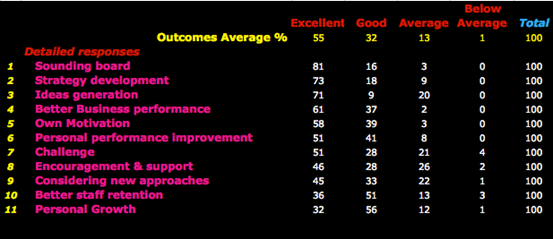By David Cartney, International Business Mentors
Introduction
Many business owners and managers have significant financial blind spots that hinder their ability to effectively manage the financial dynamics of their business. This can lead to financial challenges and in some cases to the loss of profits, or unforeseen and unwanted negative cashflows. In extreme cases, the business may have to close.
Financially literate directors and staff can help business owners navigate through these financial blind spots.
With financially literate directors and staff, or a good business coach, you will have a bridge to help the business make better commercial decisions in all aspects of the business. This is facilitated through various financial analyses, advice and approaches, which effectively open our eyes to these financial blind spots and allow the business to be better run financially.
Below are the Top 10 Financial Blind Spots that I see regularly that many business owners and managers face. These are critical to the success and risk of a business:
1. The importance of profit, profitability & financial sustainability
2. Cash flow and its drivers to control it
3. Returns − the need to improve returns
4. Understanding cost structures and getting the margins right
5. Disciplined and accurate cash flow forecasts
6. Balance sheet management also drives cash flow & returns
7. Cash flow statements need to be understood
8. Calculating the impact of price changes on volume & cost structures
9. How to use net present values (NPV’s) & pay back periods
10. Improving working capital management with banks in mind
As you go through each blind spot, ask yourself these two questions:
1. Does this apply to my current business?
2. How can I improve on these blind spots?
Blind Spot 1: The Importance of Profit, Profitability & Financial Sustainability
The importance of delivering a profit cannot be understated for all businesses. Profit drives cash flow and losses that will eventually turn into negative cash flows, which increases debt and the risk to the business.
It is therefore essential that business management understands that although revenue is critical, it must be achieved with good profitability, as revenue without enough profit will undermine any business’s financial performance and cash flow.
Improving profitability requires financially literate directors and staff to analyse cost structures to ensure that margins are correctly calculated and to focus business on improving the profitability.
With good margin information, the outlook for a business can be forecast and assessed. This can be achieved by analysing the life cycle of its products and/or services and customers, as the future profits will be driven by their profitability and life cycles.
Adequate planning of future profits is an area in which financially literate directors and staff are well placed to analyse, advise, support with costing, and predict the financial impact of profit trends and business decisions. Decision-makers should seek these analyses or consider business coaching when assessing financial performance and before making their decisions.
Blind Spot 2: Cash Flow and the Drivers to Control It
Where management of a business has insufficient grasp of the drivers of cash flow, there is a high risk that the cash flow is not being optimised, or worse − decisions may steer the business in the opposite direction to that intended.
Financially literacy should enable analysis of net cash flow, its drivers and help monitor financial trends in the business and convey what steps may be taken to improve their cash flow.
Further, the financially literate directors and staff should understand what drives cash flow for each part of the business, as each has its own financial dynamics and its own constraints in what can be done in its peculiar circumstances. Each area or business faces its own financial dynamics and is impacted by its industry and business sector.
Management that grows the revenue but ignores the funding requirements needed to support that growth in increased working capital are putting the whole business at risk. The business may face increasingly negative cash flows as a result of such business growth strategies despite increases in their profit.
Financially literate directors and staff (or a business coach or mentor) are well placed to analyse the complex cash flow requirements and cash flow dynamics and drivers, assisting management to monitor and improve their cash flow, particularly during growth periods.
Blind Spot 3: Returns − The Need to Improve Returns
Many businesses poorly understand the concept and analyses of returns, and financially literate directors and staff should calculate the returns for various aspects of their business. They can bring these return calculations to management’s attention and make recommendations so that management can increase returns or exit those areas where returns are insufficient.
By taking action that is focused to improve returns, management will make better informed decisions to improve the business’s returns. Improved returns will help attract and retain providers of funding for both debt and equity. The improved returns will make the business a better investment prospect for the business owners and assist with future business growth strategies.
Other areas include: the expected returns from decisions such as whether to invest or not in CAPEX or acquisitions, or R & D where this type of financial analysis can support all businesses.
Blind Spot 4: Understanding Cost Structures and Getting the Margins Right
The complexity of many businesses makes calculating the costs and allocating these to products or service sometimes very difficult for management. If costs are materially incorrect, this will result in unreliable costs, misleading margins and potentially inappropriate decisions that result in profit deteriorating unnecessarily or valuable opportunities being missed.
As financially literate directors and staff can carry out costing properly, this will give vital information about good and bad profitability to decision-makers to help them make decisions with confidence, such as which products or services to push or drop.
Analysis of the costs opens the cost structures to direct assessment and to the potential of cost cutting and effort optimisation.
Financially literate directors and staff, as well as business coaching professionals, are invaluable in the costing process and have a deep understanding of cost structures. This process can establish more dependable margin information, aid decision-making in the critical area of products or services management, and facilitate cost cutting, as appropriate in a sensible way relevant to the business and its strategic direction.
Blind Spot 5: Disciplined & Accurate Cash Flow Forecasts
Most businesses cannot survive long without a disciplined approach to forecasting their financial results on a regular basis − forewarned is forearmed!
Financial forecasts predict events such as:
- When increased funding will be required
- If a payment of a dividend is sustainable
- Should we invest in CAPEX or another business?
The discipline of financial forecasts focuses management regularly on the actions required to maintain the business’s financial performance. This will also support the business plan implementation. Updating forecasts regularly is usually required, as most business’s experience changes in the business environment rapidly and they need to adapt to the new financial realities as these happen.
Financially literate directors and staff are invaluable in the process of forecasting with their analytical skills and ability to flex forecasts for changes in the underlying and changing financial sensitivities.
Blind Spot 6: Balance Sheet Management Also Drives Cash flow & Returns
As growth in the net operating assets is a significant contributing driver to changes in funding, returns and net cash flow, the importance of good balance sheet management cannot be understated.
Financially literate directors and staff, as well as business coaching and mentoring professionals, understand the impact of changes in the net operating assets and must ensure that management gains from their insights.
If businesses are managed solely based on profit, then the accountant must ensure that management understands that changes in the operational balance sheet directly impact net cash flow and returns. The management must consider their balance sheet dynamics when making decisions. Financially literate directors and staff can do this by explaining why changes in the operating net assets are significant drivers of short-term net cash flow.
And further, balance sheet management needs to have appropriate resources dedicated to improving all aspects of the net operating assets, including through debtors, WIP and inventory reduction, and extending creditors on a sustainable basis.
The absolute level of net operating assets also drives the returns from a business, and financially literate directors and staff can act as good gatekeepers to ensure that balance sheets are controlled in both working capital and the amount of non-current assets to improve returns.
Financially literate directors and staff also filter and assess investment decisions to ensure that these will result in acceptable returns, using well-understood investment approaches to improve investment choices regarding CAPEX and other noncurrent assets.
Blind Spot 7: Cash Flow Statements Need to Be Understood
Understanding the benefits of cash flow statements can be difficult for management, as these are relatively technical documents and need interpretation by financially literate directors and staff.
Cash flow statements can be practically explained by financially literate directors and staff to operational management in one-page management accounting formats. These demonstrate the impact of both profit and changes to net operational assets on the net cash flow and are reconciled back to the more technical cash flow statements.
Financially literate directors and staff, and even a good business coach, can help management to understand cash flow statements and forecast cash flows. They can also help with what can be done to improve the cash flows in the future.
Blind Spot 8: Calculating the Likely Impact of Price Changes on Volume & Cost Structures
The impact of changing prices on volume, profit, variable unit costs and net cash flow need to be calculated by financially literate directors and staff. This will allow management to work out their best options in pricing to ensure these decisions have a positive impact on the financial results.
The analyses and calculations in these areas are complex, and the financially literate directors and staff need to follow well-established models and processes in making these calculations. Not only can product or service profits be estimated, but also customer profitability needs to be established as well as cash flow and returns from customers and products or services.
These types of analyses by financially literate directors and staff have a profound impact on business growth strategies, such as which customers and which products or service should be targeted to ensure good profitability, returns and cash flow. These types of analyses require good costing information. As costs change with volume, and volume changes with price, the volumes demanded will interact with the price elasticity of demand.
Therefore, as prices change, the variable unit costs will change with changes in volume. Management will need guidance from staff or a business coach in the approaches, as well as the calculations and estimation of all variables as prices change. These are complex interactions and calculations.
In the absence of these price and volume analyses and calculations carried out by the accountant, it can be very difficult for management to estimate the impact of price changes. E.g. a price increase may result in a drop in profit and cash flow. Due to this complexity, management may fall back on “rules of thumb” that will give misleading outcomes in financial performance and lead to drops in profit and cash flow.
Financially literate directors and staff can fundamentally change the course of actions by management once their analyses are complete on the impact of price changes on volume, cost levels, incremental profit or loss, and changes to cash flow.
Thus, financially literate directors and staff can help management to shape their decisions, so that the impact of pricing impacts the financial performance in the desired direction based on a deep understanding of the detailed interactions of price, volume and unit cost structures.
Blind Spot 9: How to Use Net Present Values (NPV’s) & Pay Back Periods
The use of forecast information to make investment decisions is well used, and the Net Present Value (NPV) approach is the most widely accepted. However, NPV is only practical under appropriate circumstances and the accountant should understand the calculations and be able to perform these and advise on when it is an inappropriate method. If not appropriate, they should give advice or make suggestions of more appropriate methodologies such as payback periods to assist in the investment decision-making.
Financially literate directors and staff can better assist businesses to improve their returns and cash flow and assist in assessing the risk associated with the making of specific investments and flows of cash.
Picking the right discount rate is fundamental to using the NPV approaches, and the financially literate directors and staff need a good understanding of the appropriate discount rates − particularly the weighted average cost of capital (WACC).
In all NPV related areas, the financially literate directors and staff, or a business coach, can support management with their expert knowledge and ability to complete the NPVs, and advise on the related issues, analyses and discount rates.
Blind Spot 10: Improving Working Capital Management with Banks in Mind
Improving the working capital measures is one area of financial performance that banks tend to focus on in assessing their business customers’ facilities for renewal.
One crucial area in keeping the banks on side requires an understanding from their perspective, and that involves tracking changes and trends in balance sheets, profit and loss, returns and net cash flow.
On the working capital requirements, this can be critical to financial performance, as it can be very volatile and change rapidly with potentially immediate and significant impacts on net cash flow. Banks use a range of working capital gap calculations and trends to better understand the impact of changes in the working capital requirements of their customers. These analyses impact their opinion of the business in terms of risk and the funding requirements and what they will extend to the business.
Financially literate directors and staff, as well as business coaching professionals, will be aware of these ratios that banks monitor in their assessment of businesses. And having calculated these ratios, these can help the business to control their working capital and stabilise or reduce the working capital gaps to keep the business’s financial performance and working capital requirements within acceptable limits to the banks. This approach should reduce the risk to the business and keep the banks’ facilities more likely to be kept in place. Whereas the banks are more likely to act to reduce their exposure to a financially underperforming business, where the financial dynamics are not controlled in a desirable fashion, given the constraints of the specific business and its environment.
Conclusion
The capability of financially literate directors and staff (or an International Business Mentor) to provide valuable service and support to management and businesses generally can be greatly enhanced by ensuring that the financially literate directors and staff have a current and practical understanding of these critical areas above. The lack of these is often the undoing of businesses’ financial success. Financially literate directors and staff, or a good business coach, need to not only communicate the benefits to management, but also complete these sometimes complex and technical analyses for management.
David Cartney, International Business Mentors








 The good news from the pandemic is that many businesses have adapted and are ready to move to meet the new markets, demands and routes to market that changed behaviour. Just look at the switch into online business. The interesting areas will be the pent-up demand for services such as eating out, entertainment, travel, and a range of personal services such as in the beauty and health industries.
The good news from the pandemic is that many businesses have adapted and are ready to move to meet the new markets, demands and routes to market that changed behaviour. Just look at the switch into online business. The interesting areas will be the pent-up demand for services such as eating out, entertainment, travel, and a range of personal services such as in the beauty and health industries.